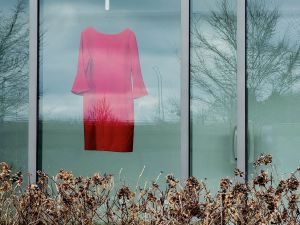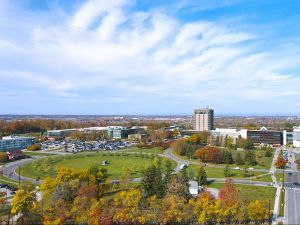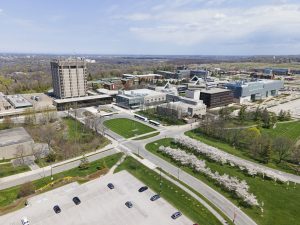 Can eco-horror stories make people think differently about climate change? Professor Martin Danahay will explore that question with his students next semester in ENGL 4V74.
Can eco-horror stories make people think differently about climate change? Professor Martin Danahay will explore that question with his students next semester in ENGL 4V74.Catastrophic weather events, killer animals and plants, and mysterious, deadly plagues have long captivated book and film lovers alike, but can they prompt action on climate change?
That’s the question Martin Danahay, Professor with Brock’s Department of English Language and Literature, will explore with students next semester in his new course on eco-horror.
Through the new offering, he plans to examine whether horror is an effective way to motivate people to take climate change seriously.
“Climate change is happening in our students’ lifetimes,” he says. “How are they going to respond to it and what might they do going forward?”
Eco-horror is a story genre that explores humanity’s fears and anxieties about the natural world. Notable film examples of the genre include Creature from the Black Lagoon (1954), Jaws (1975) and Planet of the Apes (1968).
“I like to create courses that will be relevant to students’ lives when they leave Brock,” says Danahay. “I wanted to address climate change, but I’m not a climate scientist. I teach on gothic horror, so decided to teach a course on climate disaster.”
Horror is a comforting genre, Danahay says, because viewers can watch movies and then go back to their regular lives. The stories allow people to indulge and express some of their fears, but keep it contained within a familiar narrative structure.
For the Victorians, vampires were horrific because they were degenerate, repellant and undead. The Victorians had a great fear of sexuality, so their vampires were overtly sexual beasts, he says. Modern vampires, however, are much more appealing and are often portrayed with superpowers and as somehow better than humans.
Mummies were also a source of horror to Victorians, who were fascinated with ancient Egypt. The idea of mummies killing people in England spoke to their fears about contamination coming from Egypt.
The focus of Danahay’s new course, ENGL 4V74, will be on 21st century stories, with an emphasis on climate change and virus disasters.
“We’ve experienced one virus and apparently we’re still not putting in place everything we need for it happening again,” he says. “Scientists are saying to us because of the proximity of humans to animals, the human-animal interface, it’s going to happen again.”
The course will examine novels including Station 11, which was recently turned into a TV series, and Moon of the Crusted Snow, which explores the breakdown of Canadian civilization from the point of view of Indigenous people. Margaret Atwood’s Oryx and Crake and Megan Hunter’s The End We Start From are also on the syllabus. Films will include Into the Forest and Planet of the Apes.
The humanities perspective of climate change offers an emotional aspect that rational scientific facts alone may not, says Danahay.
“These horror stories deliberately want to provoke fear and anxiety,” he says. “The horror genre is definitely trying to cause certain emotions, which may not be entirely pleasant, but they are trying to provoke you and turn facts into a narrative that can be understood.”
More information on the course is available in the English Language and Literature course calendar.









